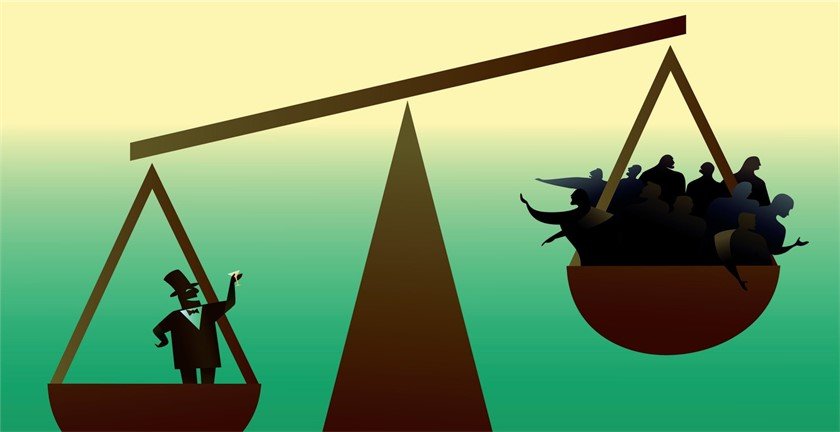Image source: thedailybeast.com
Economic equality ensures there is fairness in income distribution, goods, and services to all citizens. The gap between the high-income earners and the lower-income earners can create inequality and this can affect the distribution of wealth among individuals. Economic inequality poses various benefits and challenges to the growth of the economy.
Pros:
1. Promote growth: Greater equality makes societies and economies stronger. There is a correlation between wealth distribution and economic growth in various countries. A high level of economic inequality promotes the economic growth of the country.
2. Increase fairness: It ensures there is an equal distribution of wealth and income to individuals. Economic equality results in the utilization of redistributive state policies like progressive taxes.
3. The incentive to work hard: Income inequality motivates people to work hard in order to get more money. If there was income equality, people will not work hard or study.
4. Helps avoid destruction of economic equality: You can’t take someone’s money he has worked hard to give to someone in order to create equality. This is unfair and people can never be the same.
5. Makes people value different things: Inequality allows people to work hard for what they value most. This makes people benefit more from the things they value most in life.
6. Personal freedom: Economic inequality ensure people are empowered through a free enterprise system that helps them earn success through their own potential.
7. Spreads prosperity: When entrepreneurs are successful, they can indirectly share their wealth through creating employment opportunities for others contributing to national development.
8. Promote healthy competition: It ensures consumers have access to quality and cheap products across the world. Businesses are able to remain innovative and win the global competition.
9. Promotes stability: Economic freedom promotes a stable environment for businesses and people.
10. Equal distribution of income: It ensures the poor are taxed less whereas the rich a taxed more resulting in the distribution of income.
Cons:
1. Social problems: There are a lot of social frictions attributed to inequality like more people participating in riots. It also results in an unfair allocation of opportunities to citizens.
2. Inherited wealth: Inherited wealth promote unfairness to individuals and makes some people lazy than others since they can easily satisfy all their needs with less effort.
3. Increased crime rates: A research carried shows economic unequal societies have high crime rates. Inequalities act as an incentive to commit a crime in order to gain more.
4. Unemployment: High levels of unemployment are contributed by market failure due to inefficient distribution of resources in the free market. This increases levels of poverty in society.
5. High prices to consumers: In monopoly industries, the bargaining power of suppliers is high resulting in increased prices for the consumers. This results in an unfair distribution of income between suppliers and consumers.
6. Health effects: Income inequality among citizens limits access to health care facilities and healthy food. Adequate health facilities are unavailable to the poor population in the society and this leads to a decrease in health.
7. Increase political inequality: In societies where wealth distribution is concentrated with a few people, the political powers are always in favor of those few wealthy people. This results in a lot of corruption and oppression of the poor.
8. Increased constraints: There are many factors that hold people back like income, race, poor background, and others affecting their success.
9. Decrease in education level: The education level of people in the society is linked to the poverty level: A high degree of economic equality with a small low-income population contributes to the high level of education and vice versa.
10. Division in society: Income inequality results in division among the poor and wealthy people. The poor tend to associate with other poor people and wealthy people talk to other wealthy people.


